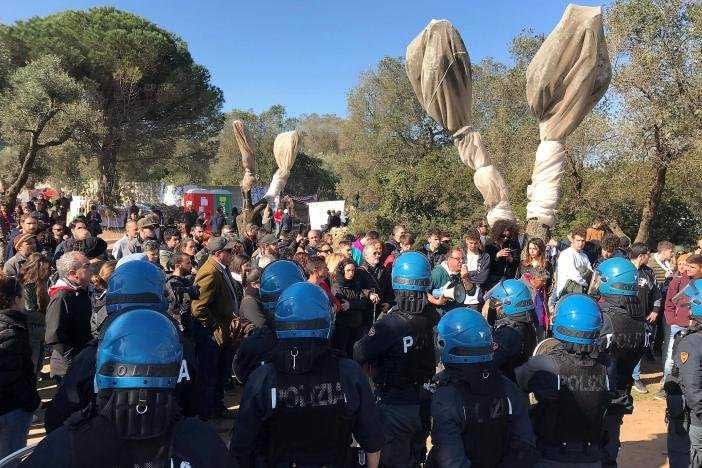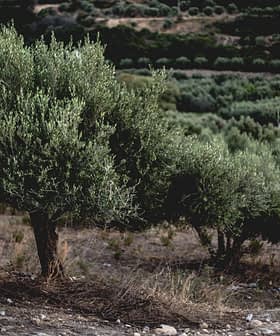Protesters in Puglia Clash With Police Over Removal of Olive Trees for Pipeline
The project has already been delayed by a year due to opposition from locals, who are fiercely opposed to the removal of olive trees, some of which are over 100 years old.
An olive grove in Puglia became a battleground on Tuesday. Protests against the removal of ancient olive trees to make way for the Trans-Atlantic Pipeline escalated as activists threw stones and bottles at police, who retaliated by charging at the protesters with batons.
Tuesday’s protests began with environmentalists lying down outside the site at Melendugno, to prevent trucks and tractors from entering. Later in the day police dispensed a group of around 50 activists including town mayors from the area and broke up a cordon made up of around 300 protesters.
Gianluca Maggiore, one of the protest leaders told the Telegraph, “Our battle is entirely legitimate and we have always wanted it to be peaceful, but the response of the police was disproportionate.”
The protests erupted following Monday’s decision by a top Italian court to give the go-ahead for work to start on the tree removal despite appeals by the local government of Puglia.
Gian Luca Galletti, Italy’s environment minister told the Telegraph, “The project is fully in accordance with all law.” He added, “We hope that common sense will prevail.”
Last week, developers uprooted 33 trees before being forced to stop by protesters. On Tuesday around 30 trees were removed according to a TAP spokesman who told Reuters the company planned to speed up the process, providing protests did not escalate.

The project had already been delayed by a year due to opposition from locals, who are fiercely opposed to the removal of olive trees, some of which are 100 years old.
The town’s council and Puglia Regional Authority have supported locals in their fight. Michele Emiliano, the center-Left governor called it “illegal” and told the Telegraph, “The government has proved incapable of listening to Puglia.”
TAP are under increasing pressure as around 2,000 olive trees need to be moved by April before they begin their growth spurt. Otherwise, their removal will be delayed until November.
Once the pipeline is complete, the trees will be replanted in their original sites. During the construction, “They will be transported to a specially designated nursery area where they will be stored and cared for, for a period of around three years,” a spokesman for the consortium told the Telegraph. “Once the pipeline construction activities are completed in 2019, the olive trees will be brought back and planted,” he added.
Campaigners fought to have the pipeline moved to an industrial area north of the olive grove. The developers claim that around 20 other locations were considered but rejected and that the route chosen will have the least impact on the region and the environment.
The $4.5 billion Trans-Atlantic Pipeline is the final leg of the 2,200-mile-long Southern Gas Corridor. It will carry gas from Asia to Europe, reducing the EU’s dependence on Russian energy.
In whose interest is the #EnergyUnion supporting the #TAP pipeline? Not the people’s interest #Melendugno@MarosSefcovic#NoTAP#fossilfreepic.twitter.com/c3mHvTeJP2
— Friends of the Earth (@foeeurope) March 29, 2017
Hundreds protest gas pipeline construction in Puglia https://t.co/ceVTmpUEEN#ItalianInsider#NOTAP#newspic.twitter.com/9dIQcFurR7
— The Italian Insider (@ItalianInsider1) March 29, 2017
#NoTap not in my name! pic.twitter.com/M7nTkU2DaZ
— Francesco Maniglio (@framaniglio) March 28, 2017
Italy, With the people who are standing in the path of the TransAdriatic pipeline to block it. #TAP#noTAP@no_taphttps://t.co/jJm6axCOr3
— eⒶtps (@eatps_) March 27, 2017
We are protectors not protestors #NoTap@NoDAPL#NoDAPL please support us pic.twitter.com/a0j4662zvX
— Maria (@GliOperai) March 29, 2017








